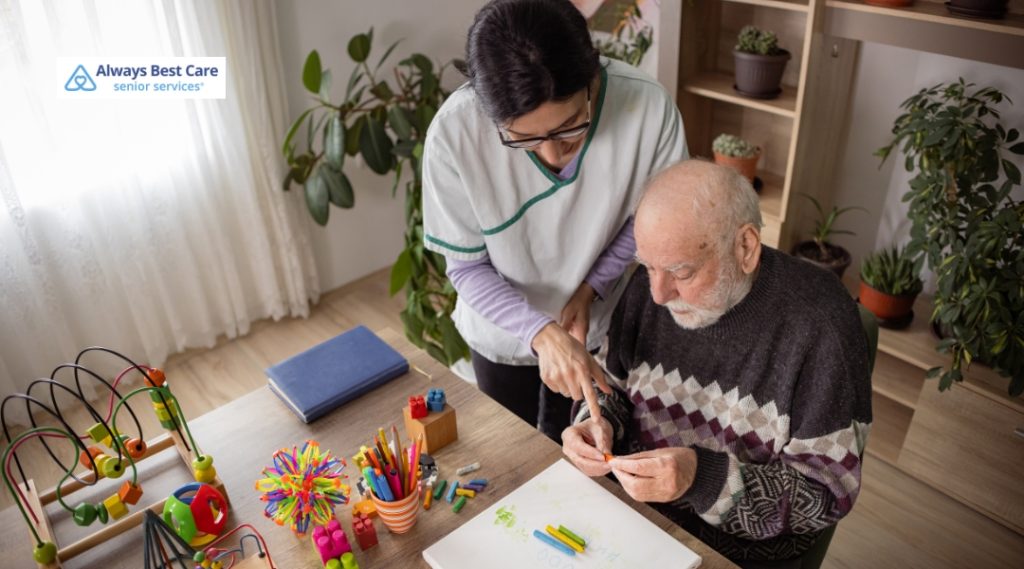Early Signs of Dementia You Shouldn’t Ignore in Mount Clemens, MI

Aging brings its own quirks—forgetting where the keys landed or mixing up names now and then.
We’ve all been there, right?
But when those little slip-ups start stacking up or interfere with daily life, it might be more than just getting older. Those could be early signs of dementia, something none of us wants to face but needs to recognize.
Catching these warning flags sooner rather than later means better care and a smoother journey ahead for our loved ones here at Always Best Care of Mount Clemens.
What you will learn:
- The key differences between normal aging and the early signs of dementia.
- The seven most common early warning signs of dementia to watch for in yourself or loved ones.
- When and why to seek professional help, plus how in-home care can support clients showing early signs of dementia and provide peace of mind for families.
Table of Contents
Normal Aging vs. Early Signs of Dementia
Before panic sets in, let’s get one thing straight: not every forgetful moment signals dementia. Normal aging can slow memory recall, like taking longer to find a word or forgetting why you walked into a room—but it doesn’t mess with everyday living.
Dementia? That’s another ballgame altogether. It’s progressive and chips away at memory, communication, judgment, and independence over time.
Here’s how they stack up:
| Aspect | Normal Aging | Early Dementia |
| Memory Loss | Occasional forgetfulness | Frequent forgetting disrupts life |
| Task Completion | Can do familiar tasks | Struggles with routine activities |
| Word Finding | Sometimes pauses | Often can’t find the right words |
| Judgment | Sound decision-making | Poor choices that seem out of character |
| Orientation | Generally aware | Gets lost or confused about time/place |

7 Key Early Signs of Dementia You Shouldn’t Ignore
Spotting these signs early on helps us act quickly for our loved ones’ sake:
- Memory Loss That Disrupts Daily Life: Forgetting appointments once in a blue moon is fine; forgetting recent conversations repeatedly isn’t. Reliance on notes or others for simple reminders raises red flags.
- Difficulty Finishing Familiar Tasks: When Grandma suddenly can’t follow her favorite cookie recipe or struggles with things she used to handle easily, like paying bills, that’s cause for concern.
- Trouble Finding Words & Following Conversations: Ever noticed someone pausing too long mid-sentence, repeating themselves without reason, or struggling to name everyday objects?
- Poor Judgment & Decision-Making: Giving away money impulsively over the phone, neglecting hygiene routines, and dressing improperly for the weather are more than just being forgetful; they’re risky behaviors we shouldn’t ignore.
- Confusion About Time & Place: Getting lost on usual routes around town or mixing up dates aren’t simple lapses, but warning bells ringing loud and clear.
- Mood Swings & Personality Changes: Someone who was once social becoming withdrawn? Or sudden irritability outta nowhere? These shifts often sneak under the radar but matter big time.
- Misplacing Items & Losing Track Of Steps: It happens—we all misplace keys now and then—but putting them in strange spots like inside the freezer is unusual, and not being able to retrace steps means trouble ahead.
When Should We Seek Help Here at Always Best Care of Mount Clemens?
Noticing any combination of these signs calls for action, not alarm! A healthcare professional’s evaluation will help clarify what’s going on. Earlier detection opens doors to treatment options that slow progression and resources that greatly ease caregiving stress.
At Always Best Care of Mount Clemens, we’re ready when you are, with personalized care plans shaped around your family member’s needs so they keep as much independence as possible while staying safe at home.

How In-Home Care Can Support Loved Ones Showing Early Signs
Taking care isn’t easy—it drains energy emotionally and physically sometimes! Having compassionate caregivers from Always Best Care by your side makes all the difference:
- Assistance with managing daily routines without taking control.
- Encouragement through mental exercises that stimulate thinking.
- Friendly companionship eases feelings of isolation.
- Monitoring health changes closely so families stay informed.
- Peace of mind knowing safety measures are always in place.
Our caregivers become part-time superheroes, helping seniors stay connected within their homes while giving families breathing room.
FAQ
Q: Is occasional forgetfulness normal as people age?
A: Yes! Everyone misplaces things sometimes, but it becomes worrisome only if memory loss interferes regularly with daily life tasks.
Q: Can mood changes alone indicate dementia?
A: Mood swings might signal underlying issues, including dementia, especially if accompanied by confusion or withdrawal.
Q: How soon should I seek professional advice after noticing symptoms?
A: The sooner you consult healthcare providers after spotting multiple warning signs, the better your chances of effective management.
Q: Will my loved one lose independence immediately after diagnosis?
A: Not necessarily; many live fulfilling lives longer thanks to tailored support like what we offer at Always Best Care.

Spot the Signs Early — Give Your Loved One the Support They Deserve!
If you’re concerned about memory changes in someone you care about, don’t wait to take action. Contact Always Best Care of Mount Clemens at (586) 690-7500 for a care consultation. Our experienced team can help you understand your options and create a care plan tailored to your loved one’s unique needs. Early support matters—and you don’t have to navigate it alone.





